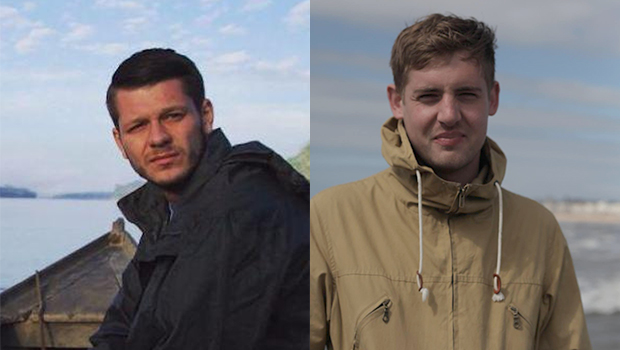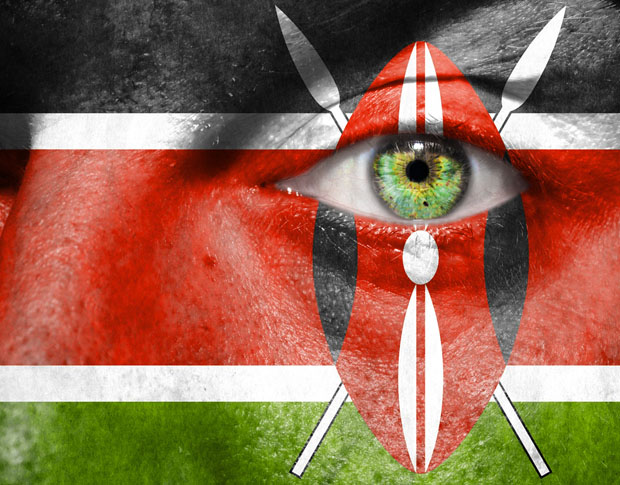Index relies entirely on the support of donors and readers to do its work.
Help us keep amplifying censored voices today.
The anti-terror charges against reporters for Vice News in Turkey are not isolated. In recent years, a number of countries have used broad anti-terror laws to restrict the freedom of the press.
Turkey

British journalists Jake Hanrahan, left, and Philip Pendlebury and Iraqi translator and journalist Mohammed Ismael Rasool were filming clashes between pro-Kurdish youths and security forces, according to Vice. (Photos: Vice News)
Two British journalists and a local fixer working for Vice News were charged on Monday 31 August in Turkey with “working on behalf of a terrorist organisation”. They will remain in detention until their trial, the date of which has not yet been announced.
The journalists Jake Hanrahan, Philip Pendlebury and Iraqi translator and journalist Mohammed Ismael Rasool were filming clashes between security forces and youth members of the Kurdistan Workers’ Party (PKK) in the south-eastern city of Diyarbakir on Thursday when they were arrested.
Turkey’s broad definition of terrorism means that any journalist reporting on PKK activities or Kurdish rights can be charged with the offence of making “terrorist propaganda” and jailed.
Index on Censorship Chief Executive Jodie Ginsberg said: “Coming just days after the unjust sentencing of three Al Jazeera journalists in Egypt, these latest detentions of journalists simply for doing their jobs underlines the way in which governments everywhere can use terror legislation to prevent the media from operating.”
Egypt

Peter Greste spoke to a Frontline Club audience about his arrest and detention in Egypt. (Photo: Milana Knezevic / Index on Censorship)
Egypt remains a cause for concern when it comes to press freedom: on 29 August 2015 Al Jazeera journalists Mohamed Fahmy, Peter Greste and Baher Mohamed were sentenced to three years in prison. The journalists were found guilty of of “broadcasting false information” and “aiding a terrorist organisation” – a reference to the Muslim Brotherhood.
The sentencing came just weeks after President Abdel Fattah el-Sisi’s government passed an anti-terror law setting a fine of up to 500,000 Egyptian pounds (£41,600) for journalists who stray from government statements or spread “false” reports on attacks or security operations against armed fighters.
Jordan

Abdullah II of Jordan at a conference in Amman in 2013. Ahmad A Atwah / Shutterstock.com
Jordan introduced a new “anti-terror” law in 2006 prohibiting, among other things, the engagement in “acts that expose the kingdom to risk of hostile acts, disturb its relations with a foreign state, or expose Jordanians to acts of retaliation against them or their money”. The charge carries a prison sentence of three to 20 years. The law was amended in 2014 to , broaden the definition of terrorism.
Interpretation of the law has been varied. According to the Committee to Protect Journalists (CPJ), in April 2015 a journalist was jailed for criticising the Saudi-led bombing of Houthi forces in Yemen. Another journalist was detained in July 2015 for breaking a recent ban on coverage of a terror plot. Earlier in 2015, an activist who criticised the royal family’s support of Charlie Hebdo on Facebook was sentenced to five months in jail under the anti-terror law.
Tunisia
One month after June’s terrorist attack on Sousse beach killing 38 tourists, for which ISIS claimed responsibility, Tunisia approved new anti-terror legislation.
Under the legislation, website editor Nour Edine Mbarki was charged in connection with publishing a photograph of a car that purportedly transported a gunman behind the beach attack. According to the CPJ, he was charged under Article 18 of the law with “complicity in a terrorist attack and facilitating the escape of terrorists,” which carries a prison term of between five and 12 years. He is currently awaiting a trial date.
Human Rights Watch said the new anti-terror bill “would open the way to prosecuting political dissent as terrorism, give judges overly broad powers, and curtail lawyers’ ability to provide an effective defence”.
Pakistan
Rights groups have long criticised Pakistan’s notorious anti-blasphemy laws for their effect on freedom of expression in the country. But strengthened anti terror legislation is also impacting the way journalists operate in the country.
In June, three Pakistani journalists were charged under the Anti-Terrorism Act, reportedly for covering the activities of a dissident politician, according to the Pakistan Press Foundation. A year before, a TV anchor was also charged under the law.
One to watch: Kenya
Following two separate attacks by al-Shabab militants in December, Kenya’s President Uhuru Kenyatta signed into law a new security bill that could curtail press freedom. Under the new law, journalists could face up to three years in jail if their reports “undermine investigations or security operations relating to terrorism” – or even if they published images of “terror victims” without police permission.
This hasn’t come into play yet – in February, the Kenyan High Court threw out several clauses, including those that could impact media freedom. The government has said it would consider lodging an appeal.
This post was written by Emily Wight for Index on Censorship
This article was posted on 1 September 2015 at indexoncensorship.org
Amran Abdundi is a women’s rights activist based in northeastern Kenya. She runs the Frontier Indigenous Network, an organisation which mobilises female peace builders and rights activists to set up shelters along the dangerous border with Somalia. It offers first aid to the injured as well as to women and girls who have been raped, moving victims to a safer part of Kenya.
As well as protecting citizens endangered by the guerrilla activities of the Al Qaeda-linked group Al Shabaab, Abdundi and her organisation also help those fleeing drought and failed harvests in Somalia. Abdundi is also behind radio-listening groups for women, which share information about access to tuberculosis treatment, among other things.
In a society that teaches women to leave decision-making to men and to look down when men pass, Abdundi’s Frontier Indigenous Network empowers, educates and mobilises rural women to challenge such outdated social codes.
The Al Qaeda-allied Islamist group Al Shabaab has sown terror in the Kenya-Somalia border region, one of the world’s most inhospitable areas. Women in the region are often the victims of violence, rape and murder. The northern region of Kenya is one of deeply conservative social customs, in which a man owns property on a woman’s behalf – even when the woman has bought the land. In the environment Abdundi operates in, a quarter of Kenyan girls and women have endured genital mutilation, despite legislation outlawing the practice.
Abdundi told Index: “I want to see them go to school. I don’t want to see them moving here and there without education – early marriage and female circumcision are also major issues.”
She said that some of the initial challenges the organisation faced have been overcome. In the beginning it was hard to talk to parents about their girls and “how the women have suffered”, she explained. “But now they understand us. They know how good we are and we want to change their lives.”
One of Frontier Indigenous Network’s biggest achievements in 2014 has been in mapping out conflict areas in northern Kenya. It focuses on the factors which fuel armed violence occurring after peace agreements are signed between warring parties. Aware that small arms and light weapons were one of the biggest obstacles to peace in the region, Abdundi and her group mapped many of the weapons used by the combatants. She then instigated a regional agreement to pursue arms traffickers, closing boltholes used by smugglers along the Somali border and developing a register of all recovered weapons. The agreement also targeted a network of groups running an illegal arms trade.
Abdundi has established radio-listening groups specifically for women, in which she encourages them to challenge the repressive cultural values preventing women from being permitted to own property or livestock. She uses the radio groups to reach women with tuberculosis, educating them about access to treatment and breaking cultural beliefs that tuberculosis is caused by curses and bad omens.
Abdundi has also mobilised women along the Kenya-Somalia border to rise against Al-Shabaab, a militant terrorist group, by educating them on the dangers of following the doctrine propagated by the terror organisation; she has received a number of death threats as a result of this work. She has also campaigned against the practice of female circumcision in northern Kenya.
She said: “My dream is to help women, girls and children. I just want to see them doing good. That’s my dream.”
This article was published on March 2, 2015 at indexoncensorship.org
Kilifi County’s Marafa ward representative Renson Kambi is working on a bill that will bar women from wearing short skirts and men from wearing tight trousers. Kambi says the motion, to be tabled before Kilifi County Assembly soon, is aimed at restoring decency. “Moral standards have gone down in Kilifi” due to “improper dressing,” he stated. “Most ladies are dressing skimpily and that cannot be tolerated.”
The bill, still in its initial stages, proposes among other things, to ban garments that “expose the flesh” in public. He said undue dressing continues to cultivate prostitution, and that the situation must be put under control before it deteriorates further. The bill, however, will not only centre around women’s dress, but also aims at barring men from wearing tight trousers.
Kambi said that it has become difficult to stroll around markets in Kilifi county, especially in the company of in-laws and children, because of the way young men and women have decided to dress. He claims young girls are now putting on micro miniskirts in schools, making it difficult for their male colleagues and male teachers to concentrate. “The girls are putting on ‘very short miniskirts’ to an extent that they cannot even pick up a pen when it falls down without exposing their flesh,” he said.
Kilifi County Deputy Speaker Teddy Mwambire is among a host of leaders who have come out strongly in support of the bill. He says it aspires to ensure that the people of Kilifi county go back to the traditional mode of dressing, bringing to an end what he labelled borrowed cultures.
Mwambire says youths have adopted a way of dressing that has to be dealt with, before immorality makes huge strides in the community. “We cannot just sit still as young people – both male and female continue roaming our streets half naked.”
But former Kilifi Town Council Chairman Anthony Kingi has admonished Kambi for planning to introduce a bill he believes will have no impact on people’s lives, saying he should come up with bills that will improve the state of education in the county. Kingi rubbished claims that improper dress is the main cause of dwindling education standards.
If the bill reaches a majority in the county assembly, it will be passed to Governor Amason Jeffa Kingi who may sign it into law or reject it. For now, debates for or against continue to gain momentum in Kilifi county and across Kenya.
This article was posted on March 12, 2014 at indexoncensorship.org

(Image: Semmick Photo/Shutterstock)
The Kenyan government’s directive to schools to use tribal mother tongues as the main language of instruction in junior school classes has elicited mixed reactions among the country’s education stakeholders. Teacher’s unions and sections of Kenyan society fear it will promote ethnic division, and separate children along tribal lines.
The unions have come out guns blazing against the directive. The Kenya National Union of Teachers (KNUT) has labelled the directive completely “analogue”, and Secretary General Mr. Wilssion Sossion said they were not consulted before it was issued. He added that the unions cannot be overlooked in these cases, and urged the Ministry of Education to suspend the directive and initiate wider consultations.
Omboko Milemba, the chairman of the Kenya Union of Post Primary Education Teachers (KUPPET), argues that directing teachers to teach in mother tongue at the lower level — class one to three, which come after nursery school and kindergarten — will serve to increase the tribalism that is already rampant in the country.
Teaching in vernacular can only work in rural areas where people from one tribe largely reside in the same place. In urban areas, however, where people from various tribes mingle, as pupils and teachers come from different tribal settings and backgrounds, it will be a challenge to enforce the directive.
Another point being raised is whether there are even enough teachers to implement the plan. According to KNUT the country needs close to 80,000 additional teachers to boost the education sector. There is a further problem in the case of smaller tribes, like the Elmolos and Ogieks, as it will be difficult to get enough teacher who can teach in their languages.
John Wesonga, from the Kakamega County Kenya National Union of Teachers says the government is confusing Kenyans with a lot of poorly planned programmes and directives. He insists they should concentrate on the promise by President Uhuru Kenyatta to give class one pupils laptops, instead of coming up with a new proposal to make Kenyans forget this earlier pledge.
Busia County KNUT branch Executive Secretary Mark Oseno, added that the directive will cause a lot of confusion in the curriculum development if implemented, as it will be applied selectively. “If the disadvantages outweigh the advantages, then it is not advisable to reintroduce mother tongue in lower classes,” he said.
A few of those in support of the plans say exposing children to their mother tongue will help them cope faster with learning a subsequent second language. Those against, however, stress the need for the government to consult education stakeholders across Kenya’s 47 counties, to prevent a plan that will divide pupils along tribal lines.
This article was published on 19 February 2014 at indexoncensorship.org